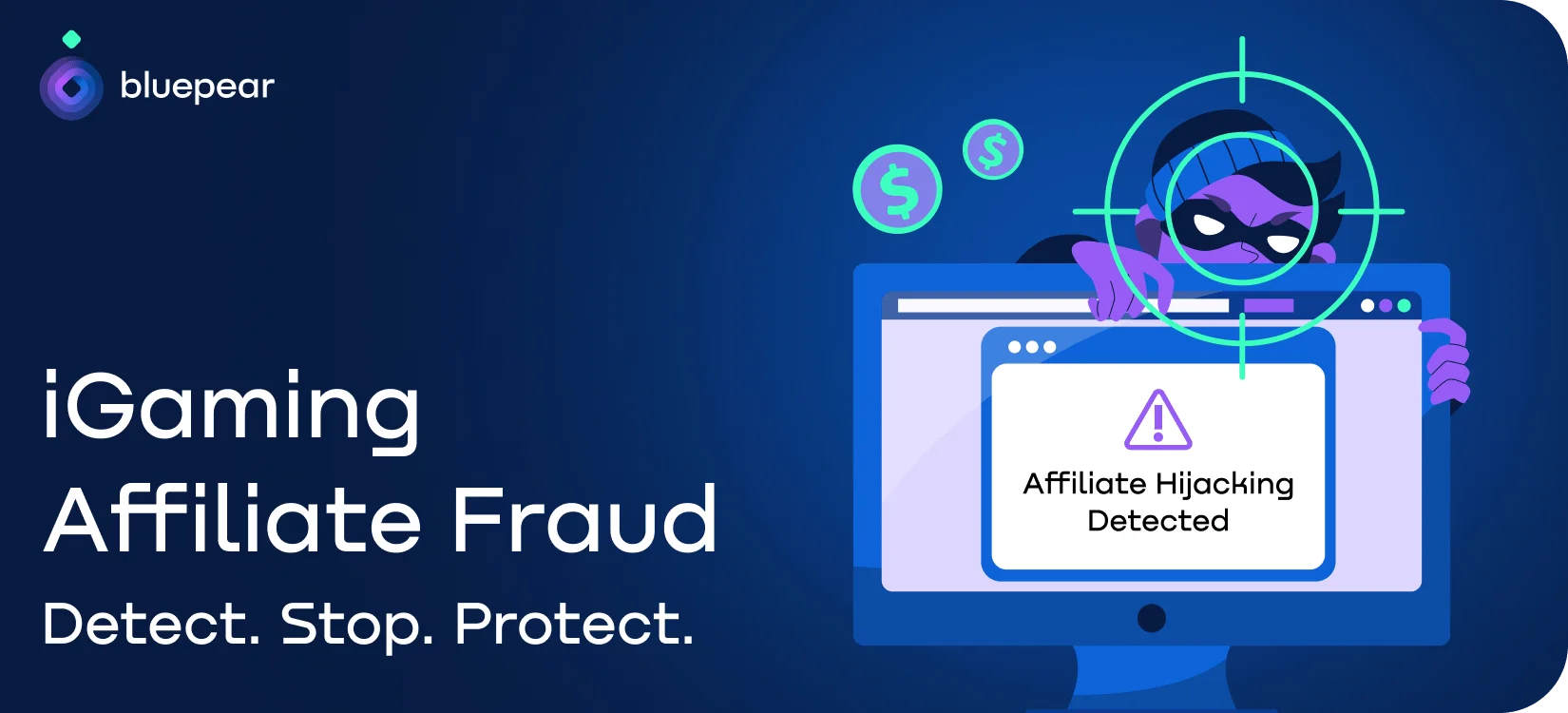
Contents
The iGaming market is booming, with revenue set to exceed $100B in 2024 and 281M users expected by 2029.
Affiliate programs are a core acquisition channel in online gambling. Giants like Catena Media report that 94% of their revenue comes from affiliate traffic, while Better Collective delivers over 500,000 new depositors annually through CPA and RevShare deals. At the same time, this channel is often exploited for iGaming affiliate fraud.
Key stats from Sumsub’s 2024 iGaming Fraud Report:
- • Online gambling fraud grew 64% year-over-year.
- • Affiliate fraud is among the top 5 fraud schemes, alongside bonus abuse and money laundering.
- • Total losses exceeded $1.2B for mobile casinos and sportsbooks.
iGaming affiliate fraud is no longer just a traffic quality issue. It’s a direct hit to your budget, your KPIs, and your license. If left unchecked, it distorts LTV data, drains CPA budgets, and triggers compliance risks.
Read on to explore how affiliate scammers operate in 2025. Discover which iGaming fraud detection tools and online gambling fraud prevention tactics can protect your brand.
What Is iGaming Affiliate Fraud?
iGaming affiliate fraud is a form of performance marketing abuse. It happens when affiliates manipulate tracking systems or violate program rules to earn commission without delivering legitimate players.
Unlike classic user fraud, where the player cheats the operator, affiliate fraud is committed by the partners themselves. It often happens at scale and involves automation.
iGaming fraud prevention starts with identifying the tactics partners use to manipulate attribution and user intent. Here are the main iGaming affiliate fraud schemes used today:
Brand hijacking. Affiliates bid on your brand terms in Google Ads, intercepting users who were already searching for you.
Bluepear specializes in detecting this scheme. The digital trademark monitoring tool simulates real user searches, takes screenshots of search results, saves the full redirect chain (including cloaked links), and logs all violations in a shared dashboard. Instant alerts are sent via email, Slack, or any other preferred messenger giving teams clear proof to act.
Cookie stuffing. An affiliate places invisible tracking cookies on users' devices, often via shady websites or browser extensions. Even if the user never clicked a real ad or interacted with the affiliate, the system falsely attributes the conversion.
While iGaming fraud detection tool Bluepear doesn’t track cookie activity directly, it helps uncover suspicious PPC patterns. Often, hijacking is combined with cookie stuffing, and Bluepear shows who’s trying to grab credit for organic traffic.
Fake traffic. Without online gambling fraud prevention, affiliates may send bots or incentivized users to simulate clicks, signups, or deposits. These users rarely convert or churn instantly, but they still trigger CPA payouts.
Although Bluepear doesn’t analyze traffic quality, it can flag unusual ad placements and repeated redirects across suspicious domains. Those are often a sign of automated iGaming affiliate fraud behavior.
Bonus abuse. Some affiliates attract bonus hunters or coordinate multi-accounting rings to extract value from promotions, rather than bring long-term players.
While this can’t be detected directly through ad activity, Bluepear helps identify GEOs and campaigns linked to suspicious traffic volumes. This way you will know which of them require deeper manual review.
iGaming affiliate fraud is rarely obvious. But with iGaming fraud detection tools like Bluepear, affiliate managers can detect the hidden tactics, protect their budgets, and finally get full visibility over what’s really happening in the search results.
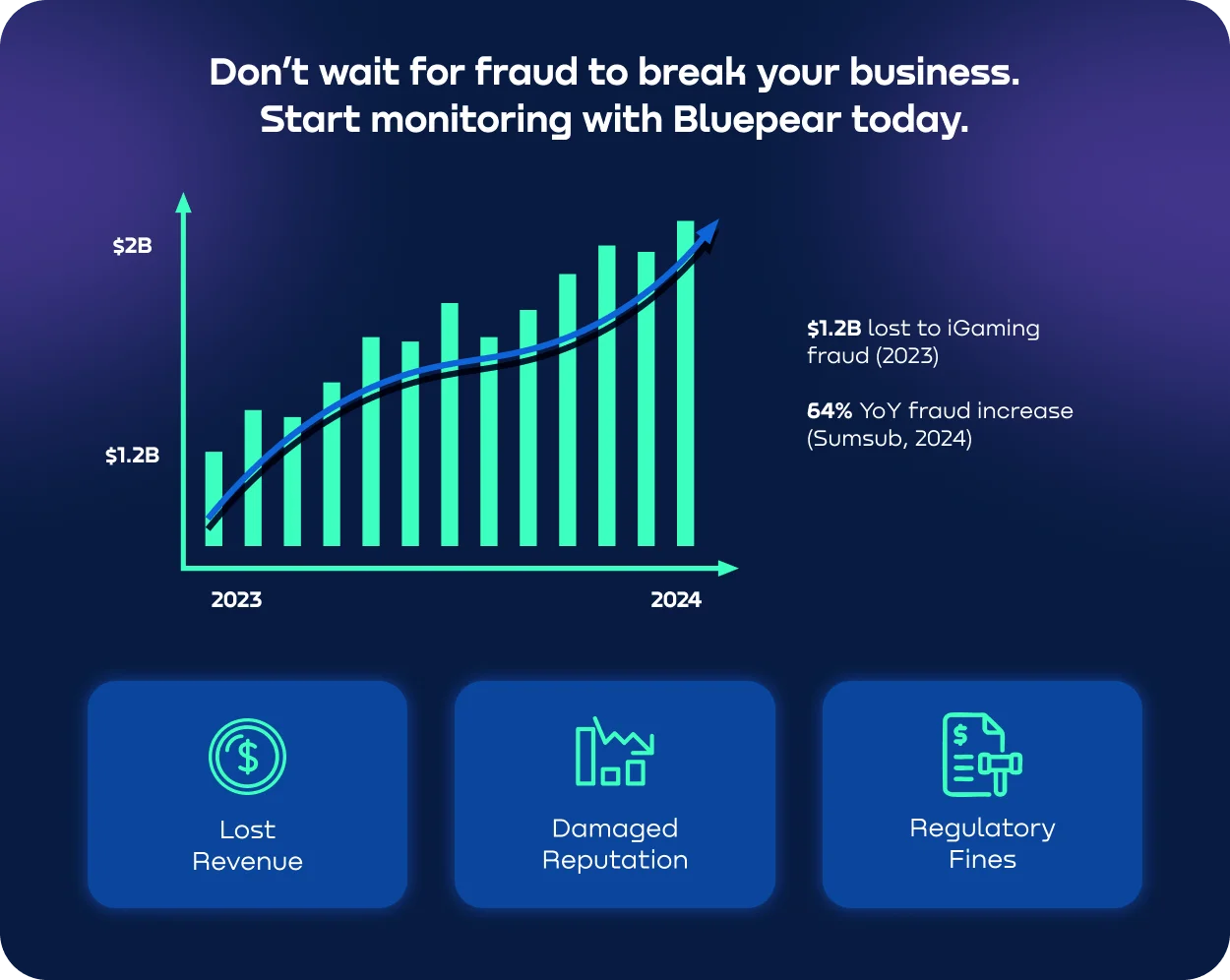
The Real Cost of Affiliate iGaming Fraud
Affiliate iGaming fraud is a growing operational risk with measurable impact on budgets, user quality, and regulatory exposure.
A research from SEON confirms how widespread affiliate fraud has become:
- • Up to 17% of CPA applications show signs of manipulation or misrepresentation.
- • Roughly 12-15% of marketing budgets are lost to fraudulent traffic, bot activity, and users who never intended to play.
- • In many cases, up to one-third of affiliate-driven registrations are flagged or declined due to fraud indicators.
According to Sumsub’s 2024 data:
- • In Q1 2024, 73% of all detected attacks in the iGaming sector were linked to selfie mismatches, a key indicator of fake players’ identities.
- • The highest fraud rates were observed in Bangladesh (8.5%), Indonesia (8%), and South Korea (6.6%), highlighting specific geo-risks for affiliate fraudulent traffic.
This issue of poor iGaming fraud prevention goes beyond just wasted budget. Regulatory bodies are increasingly holding operators accountable for partner behavior:
- • In 2023, the UK Gambling Commission issued over £214 million in fines, much of it tied to weak oversight of third-party affiliates.
- • A new UK law coming into force in 2025 will make operators legally liable for fraud committed by any affiliate partner.
- • In jurisdictions like Malta and Sweden, poor affiliate control has already led to license suspensions and denials.
Summing up, affiliate fraud isn’t just a performance marketing problem. It’s a compliance threat with real financial and legal consequences.
Common Types of iGaming Affiliate Fraud
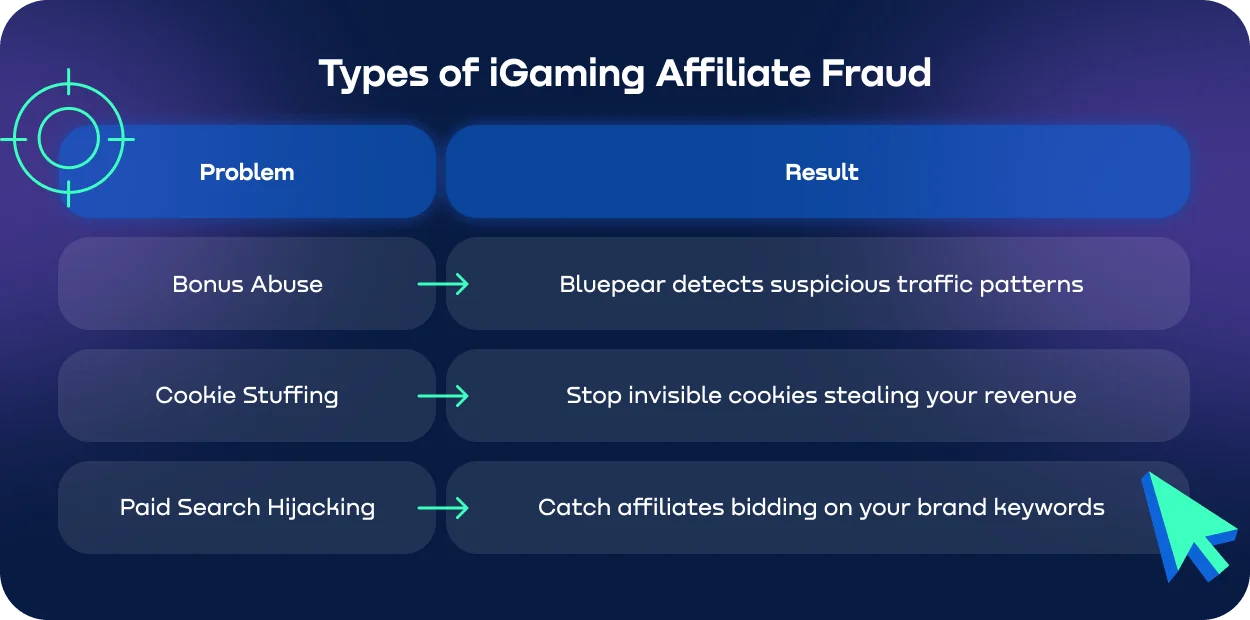
| Fraud Type | How It Works | Example Scenario |
|---|---|---|
| Trademark Abuse | Affiliates use your brand terms in search ads, domains, or content without permission. | An affiliate runs Google Ads on your casino name and intercepts organic traffic. |
| Incentivized Traffic | Affiliates offer money, bonuses, or gifts to users for signups or deposits. | A user signs up only to get cashback from a Telegram channel — never returns. |
| Misleading Ads | Affiliates use fake offers, deceptive creatives, or geo-baiting. | An ad promises 100 free spins, but leads to a different casino with no such offer. |
| Attribution Manipulation | Affiliates force tracking cookies or inject last-click events to steal credit. | User clicks no ad, but affiliate fires tracking via browser extension. |
| Fake Users | Bots, click farms, or repeated users register only to trigger payouts. | Thousands of FTDs from one GEO, all inactive within hours. |
| Content Scraping & Cloning | Affiliates copy brand assets or landing pages to pose as official partners. | A user clicks a cloned version of your landing page with a fake bonus link. |
| Multi-account Coordination | Affiliates organize groups to abuse welcome offers through account farms. | One IP creates 20 accounts, all claiming a first deposit bonus. |
What Happens If You Don’t Address iGaming Fraud
Ignoring affiliate iGaming fraud isn’t just about losing a few CPA payouts — the damage compounds quickly.
Financial losses. You end up paying for fraudulent traffic that brings no value. Fake signups, mobile click fraud, or recycled users trigger commissions, but don’t convert or churn immediately. Over time, this can eat up 12-15% of your monthly affiliate spend.
The iGaming fraud detection tool Bluepear helps protect your budget by identifying affiliates who drive traffic through unauthorized brand bidding and suspicious redirects.
PPC and SEO impact. Brand hijackers run low-quality paid ads on your keywords, hurting your real campaigns. Meanwhile, Google penalizes your domain if spammy affiliate pages outrank your site. As a result, you get rising CPCs and falling ROI, even when your own team runs clean campaigns.
Bluepear detects brand bidding in real time, capturing proof of hijacking with screenshots and redirect logs.
Regulatory exposure. Lack of online gambling fraud prevention can lead to direct licensing risks. Regulators now expect full control over your affiliate channels. In Sweden, ComeOn Group brands were penalized for affiliate-driven bonus violations, while in Malta, GoldWin Limited lost its license after compliance failures tied to marketing oversight. UK operators also face fines for irresponsible affiliate advertising under strict Gambling Commission rules.
Bluepear gives affiliate managers clear documentation of PPC violations, supporting compliance audits and iGaming affiliate fraud reporting.
Brand damage. When users land on misleading ads, fake bonuses, or cloned sites, they lose trust — not in the affiliate, but in your brand. Non-compliant affiliate behavior reflects on you, and good partners start walking away.
The iGaming fraud detection tool Bluepear helps you spot violators early, so you can clean up your partner ecosystem before real players are misled.
Remember: the cost of inaction is far higher than iGaming fraud prevention.
How to Detect iGaming Affiliate Fraud
There are two ways to catch fraudulent traffic: spot the symptoms manually or use tools built to uncover it in real time.
The manual route means keeping a close eye on anomalies like:
- • Traffic spikes from unexpected GEOs.
- • Unusually high CTRs or conversion rates that don’t match typical player behavior.
- • Mismatches between clicks and actual deposits, lots of activity with little value.
These early signs are critical to any effective online gambling fraud prevention workflow. They often look like strong performance at first glance, but they can hide bot traffic, fake users, or incentivized signups. If you’re paying for these leads, you’re losing budget without long-term return.
The more effective route is to use a purpose-built solution like Bluepear.
- • The tool monitors Google search results for iGaming affiliate fraud in real time.
- • Bypasses geo-targeting, dayparting, and cloaking that you can’t catch when checking manually.
- • Captures screenshots, redirect chains, and full audit logs for each violation.
- • Sends reports via email or any preferred messenger.
Bluepear shows you what’s really happening with your paid traffic and gives you the proof to take action fast.
Get a free 7-day trial to see who’s bidding on your brand right now.
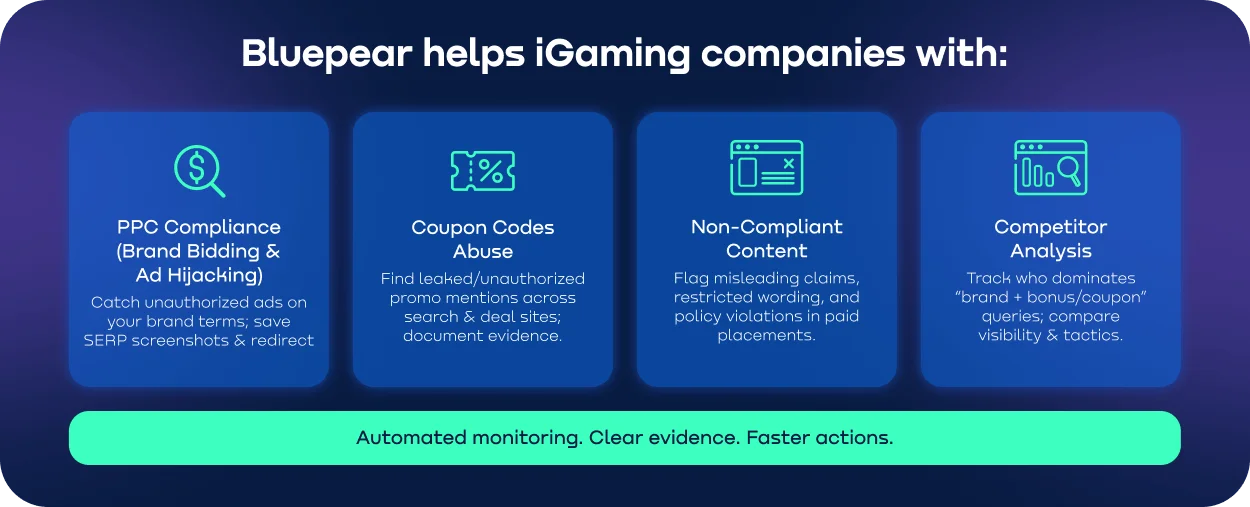
5 Best Practices to Prevent Affiliate Fraud
Affiliate fraud can’t be eliminated completely but it can be controlled with the right iGaming fraud prevention processes. Here are five best practices every iGaming operator should follow:
1. Run regular audits. Don’t rely on dashboards alone. Review traffic sources, conversion patterns, and GEOs weekly to spot anything unusual.
2. Tighten partner agreements. Make sure your affiliate contracts include strict anti-fraud clauses: no brand bidding, no incentivized traffic, no cloaking with clear consequences.
3. Layer your defenses. Use a mix of tools: KYC, device fingerprinting, behavioral analytics, and manual checks. One iGaming fraud prevention system won’t catch all the iGaming fraud.
4. Use an iGaming fraud detection tool. Bluepear gives you real-time visibility into brand bidding and redirect abuse. It uncovers what most tracking platforms miss — and sends you proof via screenshots and redirect logs.
5. Act fast. When you find abuse, pause payments and investigate. The longer it runs, the more it costs you.
Affiliate iGaming fraud moves quickly, so should your team.
How Bluepear Helps iGaming Operators Stay Safe
Online gambling fraud prevention now requires automated tools and constant oversight. Bluepear is built to give iGaming operators full visibility and control over affiliate activity, especially in paid search.
If you're paying for traffic, but not seeing the ROI you expect — it's time to look at what your affiliates are really doing:
- • 24/7 monitoring. Bluepear runs automated checks around the clock, simulating real user searches across multiple GEOs, devices, and browsers to catch unauthorized ads in real time.
- • Uncovering hidden tactics. It bypasses cloaking, geo-targeting, and dayparting — techniques that affiliates use to hide violations from internal teams or compliance audits.
- • Evidence collection. For every detected violation, Bluepear saves a full snapshot of the search result page, the redirect path, final landing URL, and timestamp. This gives you clear proof to take action.
- • Easy integration. Bluepear works alongside your existing iGaming fraud prevention stack. Use it as a focused PPC enforcement layer to close gaps in affiliate oversight.
With Bluepear, you stop guessing and start seeing exactly who’s bidding on your brand, where, and how before they hurt your budgets and reputation.
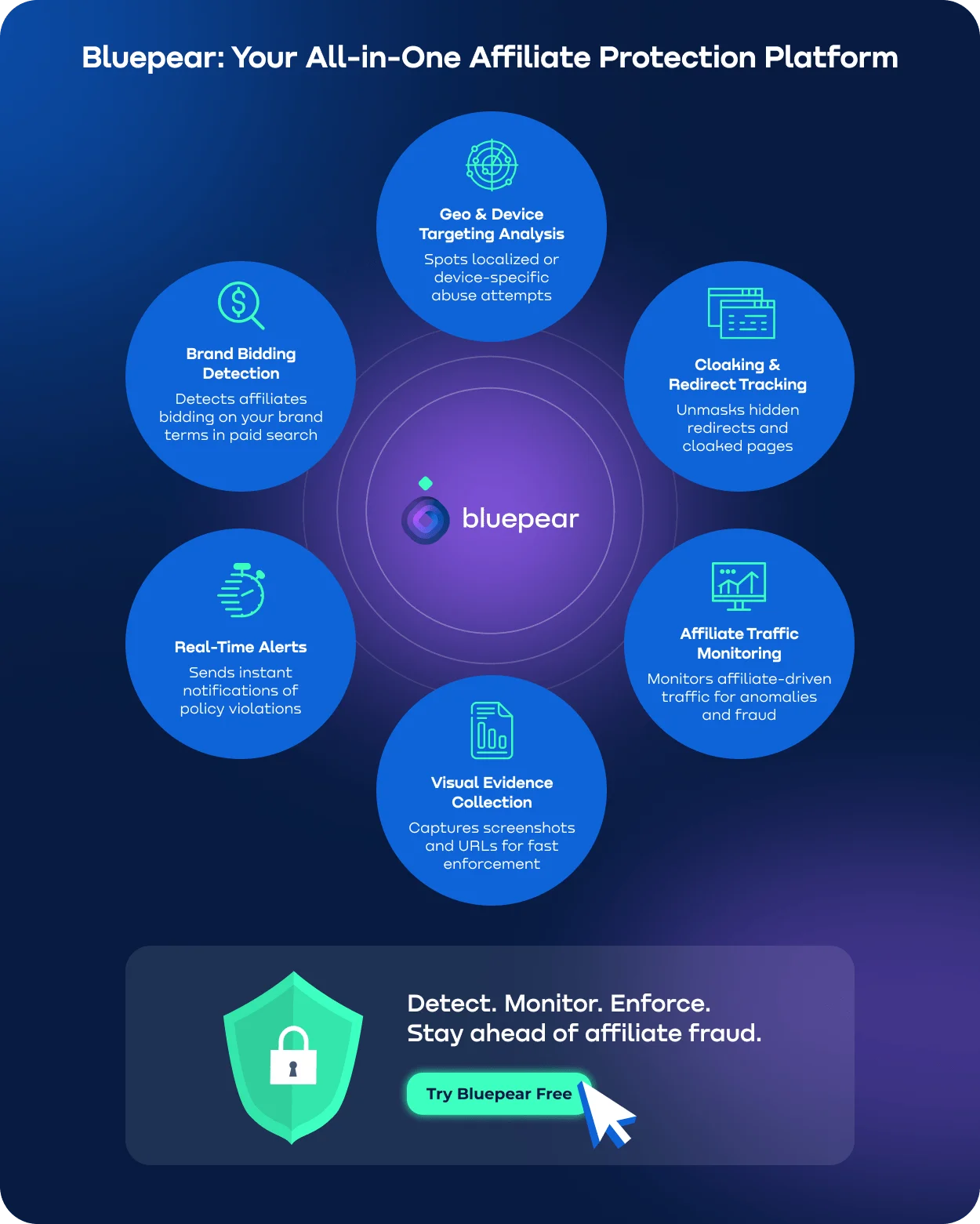
Why Proactive Monitoring Is Essential in 2025
Affiliate fraud is evolving fast with AI bots, deepfakes, and global traffic farms making manual checks ineffective. Proactive iGaming fraud prevention is no longer optional. It is how you protect your budget, your license, and your brand.
FAQ
What is iGaming affiliate fraud?
It happens when affiliates manipulate traffic or attribution to earn commissions without delivering real players — through fake clicks, brand bidding, or multi-accounting.
How does affiliate fraud hurt operators?
It wastes budgets, skews performance data, increases compliance risks, and damages brand trust.
How can Bluepear help prevent affiliate hijacking?
Bluepear monitors search results 24/7, captures brand bidding ads, logs redirects, and provides clear proof to enforce violations.
Why is online gambling fraud prevention critical in 2025?
Because threats are evolving fast. Without prevention tools, operators risk losing budget, data, and licenses.
What are early signs of fraudulent traffic?
Unusual GEO spikes, high CTR with low deposits, mismatched click-to-conversion ratios, and repeated users across offers.
Can Bluepear detect geo-targeted affiliate campaigns?
Yes. It uses residential IPs and real user agents to bypass geo-targeting and cloaking that hide violations from manual checks.
Is it worth investing in affiliate monitoring for small operators?
Absolutely. Even one abusive partner can drain thousands monthly. Early iGaming fraud detection protects budgets and licensing in any size program.

